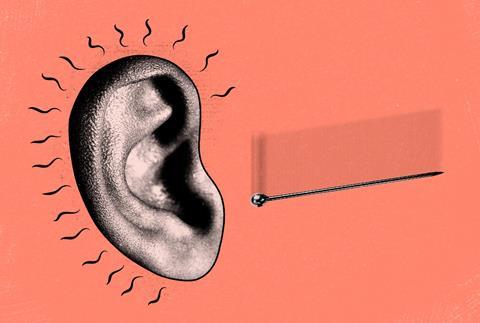
Welcome to part three in our series on leadership disciplines – a combination of spiritual practices and leadership rhythms that will have a significant impact on who we are becoming and where we are going as leaders. So far, we have discussed fasting and prayer, today we continue with the much needed but all-to-often absent discipline of silence.
Silence is not just the opposite of sound, it’s the opposite of noise. All kinds of stimulation and distraction fill our lives with noise: watching things, buying things and scrolling through things are all a form of noise. As is our relentless internal monologue, often driven by shame or guilt or the need to prove ourselves. All of this is noise. All these things are competing voices vying for our attention.
Which is a problem, because, as Brandon Cook writes: “Hurriedness and noise…cripple us from hearing the whisper of God’s Spirit that keeps us grounded in God.” Or, as Brennan Manning has it: “Our busy world too often makes us deaf to the voice of God who speaks to us in the silence.”
Which is why, if you were to ask me today: “Why do I never seem to hear from God?” I would ask you: “How regularly to you spend time with him in the silence?” Because, as the 16th-century mystic, St John of the Cross, once wrote: “God’s first language is silence.”
In the silence we train our souls to be with God and create space in our hearts to hear his voice. In the silence we incline our ear toward the “gentle whisper” of God (1 Kings 19:12). As Gordon MacDonald says: “One who walks with God will tell you plainly, God does not ordinarily shout to make himself heard. As Elijah discovered, God tends to whisper in the garden.”
Not only so, but by practising the discipline of silence in specific moments, we train ourselves to become open to God’s voice in every moment. This is the gift and power of silence.

Silence is crucial, then, because spiritual leadership is more about obedience than accomplishment. Thus, the objective for the Christian leader is simply this: to still oneself for long enough to hear the command of the Father, and to do as he says.
Here’s Cook again: “Silence and stillness is a spiritual and bodily medium through which God speaks and through which the knowledge of God comes…the discipline of silence will help transform our bodies, our hearts, our minds, and our spirits.”
Now, if you think this all sounds a bit like religious gibberish, I’m afraid I’m about to disappoint you, because Cook’s point, that silent prayer will transform us, is verifiably and scientifically accurate. Studies have shown that silence has a tremendous cognitive power to relieve stress, regenerate brain cells, reduce anxiety, and literally rewire our brains! One such study on the human brain conducted by a team at Oxford University concluded:
‘’People who regularly focus on God’s love through prayer and meditation change. They experience less stress, and they even experience a reduction in blood pressure. Their prefrontal cortex, the part of their brain associated with focus and attention, becomes more active over time, helping them avoid distraction and be more intentional. They also have more activity in their anterior cingulate cortex.
That’s the part of our brain associated with love, compassion and empathy. Focusing on God’s love makes us more loving and less angry. It’s easier for us to forgive ourselves and others.”
Thus, when Scripture instructs us to “be transformed by the renewing of your minds” (Romans 12:2), this is literally, scientifically, what is happening when we practise the spiritual discipline of silence. It’s almost as if God actually made us and has an idea about the best way to live!
“By practising the discipline of silence in specific moments, we train ourselves to become open to God’ voice in every moment”
So what have we seen so far about the power of this spiritual discipline? Silence will:
- put us in contact with the Spirit of God
- open us up to the voice of God
- rewire our brains and regenerate brain cells
- reduce anxiety
- relieve stress
- reduce blood pressure
- increase focus
- make us more attentive and less easily distracted
- make us more loving, more empathetic, more compassionate, more forgiving and less angry.
Sounds great, right? But before we get ahead of ourselves it’s important to note that occasional moments of silence will have little impact, it has to become a practice. It takes a habitual commitment to silence to become attuned to the transforming whisper of God.
As such, I want to encourage you to embrace a simple practice that will have a profound affect: centring prayer.
Brennan Manning describes this practice in four simple steps in his excellent book, The Signature of Jesus.
- Take a few minutes to relax your body and quiet your spirit. Then, in a simple act of faith, be present to God dwelling in the depths of your being.
- Choose a single sacred word or phrase that captures something of the flavour of your intimate relationship with God. A word such as ‘Jesus’, ‘Abba’, ‘Peace’, ‘God’ or a phrase such as ‘Abba, I belong to you’ or ‘Help me live in your presence’. Without moving your lips, repeat the sacred word inwardly, slowly and often.
- When distractions come, as they inevitably will (even in the most advanced pray-ers) simply return to listening to your sacred word.
- After a 20-minute period of prayer, conclude with the Lord’s prayer, a favourite psalm or some spontaneous words of praise and thanks.
“And do not evaluate, measure or judge your periods of contemplative prayer,” says Manning. “In our achievement-oriented society, we’ll probably begin to pray with a superficial concern for results in a futile attempt to discern if our investment of time and energy was worth it: did it produce any luminous insight or extraordinary experience? That kind of spiritual materialism will disappear, the ego will be purified, and self-consciousness will fade through the practice of daily prayer.”
Manning asks us to go for 20 minutes, but I’m only asking you to go for five. And the reason I am asking you to do this is because every single one of us can find five minutes every day. Anyone, introvert or extrovert, busy or with time on their hands, can do this. You can do this.
So there’s your challenge, five minutes a day. And if after all that, I have still failed to convince you to integrate this practice of silence into your life, perhaps the great Mother Teresa can:
“We need to find God, and he cannot be found in noise and restlessness. God is the friend of silence. See how nature – tress, flowers grass – grow in silence; see the stars, the moon and the sun, how they move in silence…the more we receive in silent prayer, the more we can give in our active life. We need silence to be able to touch souls.”
If we want to be children’s and youth workers who genuinely touch souls, it starts with God in the silence.
We have launched a video series based on ‘Leadership 101’.











































